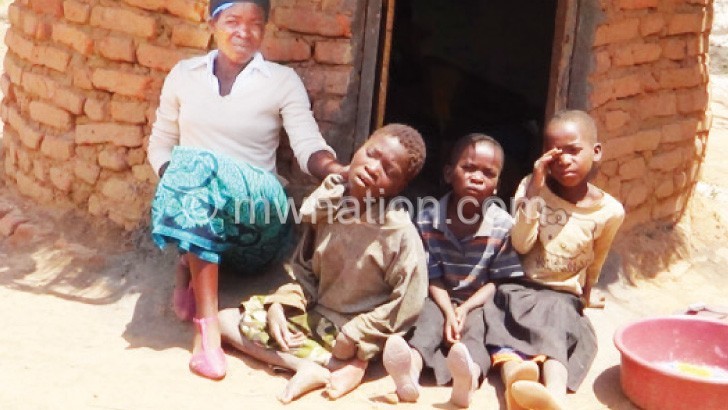Groans of neglected girls
Looking after three sisters, Esther Maliko-Kalaya has never had an easy childhood. The 17- year- old is overburdened. To get to her Phereni Village in Ntchisi, we surmount a dusty, winding earth-road on a sweltering Thursday morning.
The place that the four siblings call home perches atop a conical hill in the remote part of Traditional Authority (T/A) Vuso-Jere terrirtory.
The faces of Memory,3, Adziwa, 11, and epileptic Tiyenkhu, 15, are illuminated by effortless smiles when we visit them to appreciate their struggles.
“Welcome! Make yourself comfortable on the mat,” they chorus.

They have learnt to unite in times of joy and sorrow. The sisters once lived happily.
But Esther tells us they lost the joys of childhood when their mother died of cervical cancer in 2013. Their father deserted them to marry in the neighbouring Mbonekera Village.
“Since then, l became the breadwinner of the family. Frankly, life is miserable,” she says.
He stopped supporting them in anyway, they say.
“He occasionally comes to see us, but empty-handed. We have nowhere to go. Our granny is very old and she cannot afford to raise us,” Esther says.
Beside chronic food shortage, the child-headed family lacks decent housing.
The adolescent girl takes us into their tiny grass-thatched round hut where they squeeze themselves at night. Its falling apart.
Inside, old tattered clothes are crammed in a plastic bag leaning against the wall. The beddings are threadbare, dirty and smelly.
The hut is too small for them, considering the chronic condition of their sibling battling with epilepsy.
The girl’s frequent illnesses and the need to fend for the family forced Esther to drop out of Standard 8 Eight, the second time she failed to sit Primary School Leaving Certificate of Education (PLSCE) examinations.
Her tale is common as nearly 52 out of 100 girls who enrol in Standard One do not complete primary education.
We track down the girls’ father, who is said to be a busy man.
Fortunately, we bumped into him at Chinthembwe Village, almost a kilometre away from his children’s haunted home.
McConnell Kalaya, 46, fervently quashes the girls lamentations, claiming he lives with them in Phereni.
“Housing is a serious problem. Had I not been supportive, they would not have been alive today,” he says.
Garbed in a green coat and a black pair of trousers, the carpenter-cum-builder says he wants to construct a new home for the five, but he has always said so.
Neighbours laugh off Kalaya’s claims that he fends for his children.
Ntchisi Women Forum Programmes coordinator Emily Jambulani, who lives near the sisters in agony, says the children constantly complain of their father’s negligent conduct.
She describes their living conditions as “totally appalling” and the house “a death trap”.
“We visited Esther one day and it is a pity she has to work in other people’s fields just to ensure that her little sisters have something to eat.
“The house she lives in together with her sisters is dilapidated. It may fall on them if nothing is done by the next rainy season,” says Jambulani.
Improving the welfare of vulnerable children and safeguarding them from intolerable hardship are the core responsibility of district social welfare offices spread across the country.
Ironically, Ntchisi social welfare officer Victor Matayataya says he is unaware of the plight of Esther and her sisters.
He decried the office’s failure to locate vulnerable children in remote parts of the district.
He says: “I think we need to do our job well because if these cases are happening while we are there, it is upon us to report immediately.
“ We have community structures at village development committee and area development committee levels and we need to look at what caused this case not to be reported to us immediately.”
According to the government official, child-headed families in the district are on the rise due to poverty, parental neglect and orphanhood, especially deaths of parents due to HIV and Aids.
“We are going to engage community leaders in Phereni Village and development partners in the district to get to the bottom of the situation of Esther and her siblings,” he says.
A teacher at Ndevu Primary School, where Esther used to learn, says it is not too later to bring her back in class and revive her dreams.
“Should someone step in to meet the needs of her sisters and send her to a boarding school, she will be free to concentrate on her education,” says Roderick Kakhongwe.
Her present struggle to fend for the family puts her future on the knife edge as some ‘opportunistic’ people may take advantage of her poverty to abuse her sexually.
Esther hopes to return to school.
But the situation she is grappling with is gradually shattering her dream of becoming a nurse.
Hopeless and helpless, she sees no helping hand to rescue her and the sisters from the jaws of poverty.
Sadly, the father does not seem to care about what he is supposed to be doing every day. n





